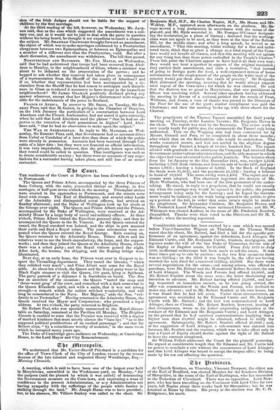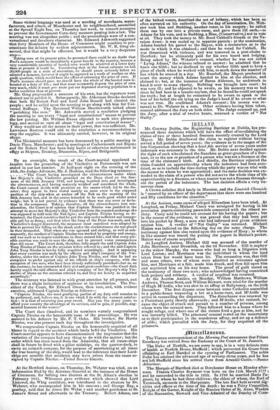'ELb II:40601m.
At Church Stretton, on Thursday, Viscount Newport, the eldest son of the Earl of Bradford, was elected Member for the Southern Division of Shropshire, in the room of the Earl of Darlington, who has succeeded to the Dukedom of Cleveland. There was no opposition. Lord New- port, who has been travelling on the Continent with Lord Clive for two years, left Naples about three weeks back for Shropshire; but he was detained at Rome by illness. His proxy at the election was Mr. C. 0. Bridgeman, his uncle. Some violent language was used at a meeting of merchants, manu- facturers, and others, of Manchester and its neighbourhood, assembled at the Spread Eagle Inn, on Thursday last week, to concert measures to prevent the Government Corn-duty measure passing into a law. The meeting was not altogether public ; and the proceedings were of a con- versational and desultory character. Mr. Edmund Ashworth suggested that forty Members of the House of' Commons might combine to pro- crastinate the debates by endless adjournments. Mr. W. R. Greg ob- served, that that might be effectual, but it would be a very desperate step— Taking corn at its present price, he presumed there could be no doubt that Peel's measure would be immediately a great benefit to the country, because a very considerable quantity of bonded corn would be admitted at a lower duty than at present it could be. Considering that at the lowest estimate we had 30,000 people in a state of starvation, we should pause seriously- before we adopted a measure, however it might be approved as a mode of warfare on this great question, which would have the effect of enhancing the price of corn. If Peel's measure should pass, we should have the whole of the bonded corn li- berated at a duty of 108.; and that must necessarily depress the price of corn very much, while it must pro Canto put our depressed starving population in a better condition than at present.
Mr. Greg propounded a measure of his own, but the reporters were desired not to publish it. Subsequently, Mr. Alderman Brooks declared that both Sir Robert Peel and Lord John Russell had cheated the people ; and he called upon the meeting to go along with him for Uni- versal Suffrage. The Reverend William Shuttleworth talked about "perishing like men." Mr. Ashworth moved a resolution pledging the meeting to use every "legal and constitutional" means to prevent the law passing. Mr. William Evans objected to such nice phraseo- logy, and moved to omit all about "legal and constitutional means ": f they would use all the means in their power, that was sufficient. Mr. Lawrence Rostron would add to the resolution a recommendation to stop the supplies. It was ultimately carried, however, in its original shape.
The Ministerial measure has been denounced by a public meeting in Dncie Place, Manchester ; and by meetings at Cockermouth and Ripon; and Sir Robert Peel has been duly burnt or otherwise maletreated in effigy at Skipton, Bramley, Braunston, Ripon, and Bridgnorth.
By an oversight, the result of the Court-martial appointed to inquire into the grounding of the Vindictive at Portsmouth RILS not stated in our last number. At half-past eight on the evening of the 18th, the Judge-Advocate, Mr. J. Hoskins, read the following sentence.-
- . "The Court having investigated the circumstances under which her Majesty's ship Vindictive grounded on the Dean shoal on the fore- noon of the 26th Jauusry 1842, and having inquired into and investigated the circumstances, and having maturely weighed and considered the whole, the Court cannot decide with precision on the causes which led to the dis- aster: they appear to have rested mainly on some error in the supposed position of the ship when at anchor off the Nab on the morning of the 26th January last, and in the course intended to be made good whilst under weigh; but it is not proved by evidence that there was any error or devia- tion in the compasses. TakinF, therefore, all the circumstances into con- • aideration, the Court is of opinion that Captain Nicolas was justified in the attempt to move her Majesty's ship Vindictive from the exposed anchorage she was supposed to hold near the Nab light; and Captain Nicolas having so de- termined, the Court considers that he put the ship under sufficient and manage- able sail for so doing; and that when the buoy of the Dean was made, and the Vindictive's danger discovered, the measures most expedient were adopted by him to prevent her falling on the shoal, under the circumstances she was placed in then demanded. That when she was aground and striking, as well as sub- - sequently, the conduct of Captain Nicolas was marked by propriety and energy, and was such as to inspire confidence in those around him ; and that every pos- sible exertion was made to save the ship, and to prevent worse consequences than did occur. The Court doth, therefore, fully acquit the said Captain John Toup Nicolas of blame on the occasion before referred to ; and the said Captain John Toup Nicolas is hereby fully acquitted accordingly. And it appearing that every exertion was made by the officers and ship's company of the Vin- dictive, under the orders of Captain John Toup Nicolas, and that he had no complaint to prefer against any of his officers or ship's company, with the exception of two men, who have been already sufficiently punished—but as, on the contrary, he has commended their zeal and great exertions—the Court doth hereby acquit the said officers and ship's company, of her Majesty's ship Vin- dictive of blame on the occasion referred to, and they are hereby so acquitted accordingly."
The sentence was listened to with great attention by all present, and there was a slight indication of applause at its termination. The Pre- sident of the Court, Sir Edward Owen, then rose, and, with evident emotion, addressed Captain Nicolas as follows-
" Captain Nicolas, the most gratifying portion of my duty still remains to be performed, and, believe me, it is one which I do with the warmest satisfac- tion: it is that of returning you your sword. May you live many years, to afford your country the advantage of its tervices, and to gain, if possible, aug- mented honours to the wearer."
The Court then dissolved, and its members warmly congratulated 'Captain Nicolas on the honourable issue of the proceedings. He was assisted in his defence by Mr. P. T. Oake. His brother, Sir Harris Nicolas, was also present each day throughout the investigation. We congratulate Captain Nicolas on his honourable acquittal of all blame in regard to the accident which lately befel the Vindictive. His Court-martial appears to have discountenanced the impression that the variation of the compass had any thing to do with the matter ; but the . order which has since issued from the Admiralty, that all steam-ships shall in future be fitted with a pillar midsbips, on the quarter-deck, to • carry an azimuth compass, for the purpose of ascertaining at all times the true bearing of the ship, would lead to the inference that their Lord- ships are sensible that accidents may have arisen from the cause as- signed by Captain Nicolas.— United Service Gazette.
At the Hertford Assizes, on Thursday, Dr. Webster was tried, on an information filed by the Attorney-General at the instance of the House of Commons, for bribing two electors at the St. Alban's election in February 1841. Witnesses gave evidence which showed that Lord Listowel, the Whig candidate, was iutroduced to the electors by Dr. Webster, who accompanied him in his canvass ; and George Ray, a postboy, said that he drove Dr Webst r and another gentleman to St. James's Street and afterwards to the Treasury. Robert Adams, one of the bribed voters, described the act of bribery, which has been so often narrated on his authority. On the day of nomination, Dr. Web- ster took him and Stebbiug, another voter, to his surgery : he called them one by one into a private room, and gave them 12/. each,—to Adams for his vote, and to Stebbing, a Blue, (Conservative,) not to vote at alL They took the money to Mr. Bond Cabbell's friends at the Ire- rulam Arms : it was sealed up in separate parcels : at the nomination, Adams handed his parcel to the Mayor, with a declaration as to the mode in which it was obtained ; and then he voted for Cabbell. He was threatened with violence, and was removed in a post-chaise to Hertford : but be ultimately paid for his own board and lodging. Being asked by Mr. Webster's counsel, whether he was not called "Lying Adams," the witness refused to answer : he admitted that he knew one Gibb ; bat he declined to say whether Gibb used to keep a piece of chalk when he worked with him, to mark down the number of lies which he uttered in a day. Mr. Rumball, the Mayor, produced in court the money which Adams handed to him at the election, and claimed it ; but, at the instance of Baron Alderson, be undertook to hand it over to some charity. Stebbing was brought into court : he was very ill ; and he objected to be sworn, as his memory was so bad since he had been in a lunatic-asylum, that he feared he could not speak the truth ; but at length he consented to be sworn to speak to the best of his belief, the sin lying on the Judge's head if he swore to what was not true. He confirmed Adams's account ; his money was re- turned to Dr. Webster in a note. Other evidence having been taken, counsel addressed the Jury on both sides. The Judge summed up, and the Jury, after a trial of twelve hour:, returned a verdict of " Not Guilty."



























 Previous page
Previous page